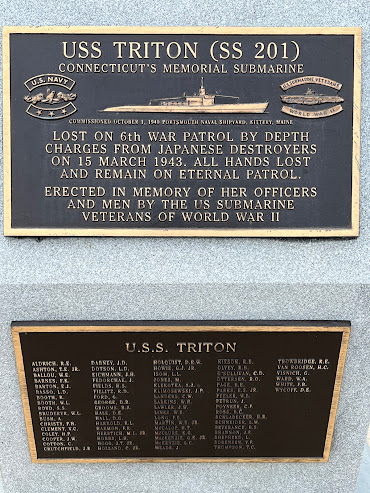Niantic Campground- Niantic, CT
Niantic, CT is close to Groton CT, which is the home of the US Navy Submarine Service. Mark was never stationed at Groton, but he did go there for various submarine training. Obviously, this was on our must see list.


USS Nautilus (SSN-571) was the world's
first operational nuclear-powered submarine and the first submarine
to complete a submerged transit of the North Pole on 3 August 1958.
The new nuclear-powered Nautilus was authorized
in 1951. Construction began in 1952, and the boat was launched in January 1954,
attended by Mamie Eisenhower, First Lady of the United States, wife
of 34th President Dwight D. Eisenhower; it was commissioned the following
September into the United States Navy. Nautilus was
delivered to the Navy in 1955.
Because her nuclear propulsion allowed her to remain
submerged far longer than diesel-electric submarines, she broke many records in
her first years of operation and traveled to locations previously beyond the
limits of submarines. In operation, she revealed a number of limitations in her
design and construction. This information was used to improve subsequent
submarines.
Nautilus was decommissioned in 1980 the
submarine has been preserved as a museum ship at the Submarine
Force Library and Museum in Groton, Connecticut.
This was the center panel from the Wall of Honor of WWII Submariners that were lost and on Eternal Patrol. The names of all the men lost are etched into the wall. This memorial was a very moving visual tribute to the many submariners lost.
This was another part of the memorial to those lost but not forgotten. The navy refers to their dead as being on eternal patrol. It is a sign of utmost respect for those lost.
The US navy had 263 submarines in service during WWII. This is a listing of the 52 submarines lost during the war.
The conning tower of the USS Flasher was restored and placed in the Submarine Memorial. A conning tower was the attack center of early naval submarines that was directly above the control room. After the war, improvements in technology were made in the design of submarines and conning towers were no longer used.
Submariners and submarine veterans are a
strange group of people (says the submariner of this duo). We served the
country during our time in the service. The crew on a submarine became a family. So, we not only served the country, we served
each other. Without each other, we risked
having the surfaces not equal the dives (that would be a submarine lost). We not only are joined together with those with whom we served, we are also joined with those that served at different times and served on
different ships. We are a very small community that gather often to see each
other and tell sea stories. Only another submariner can fully understand the dynamics involved in our time we served in the navy.
Ironically, we have met quite a few submariners on our journey. It is always interesting to trade stories with those we meet. Not everyone knows or understands the jargon used by submariners, so it is always a good thing when Mark can "talk the talk" with others that understand the lingo. Mark typically wears navy veteran hats and often shirts, so that provides them with a prompt to chat with him.
Just
to look at the numbers, here they are:
4.7% of the US population are Military Veterans.
0.8%
of the US are Navy Veterans.
0.07% are Submarine Veterans.
We were overlooking a cove at Rough Neck State Park while hiking in the park.












.JPG)



No comments:
Post a Comment